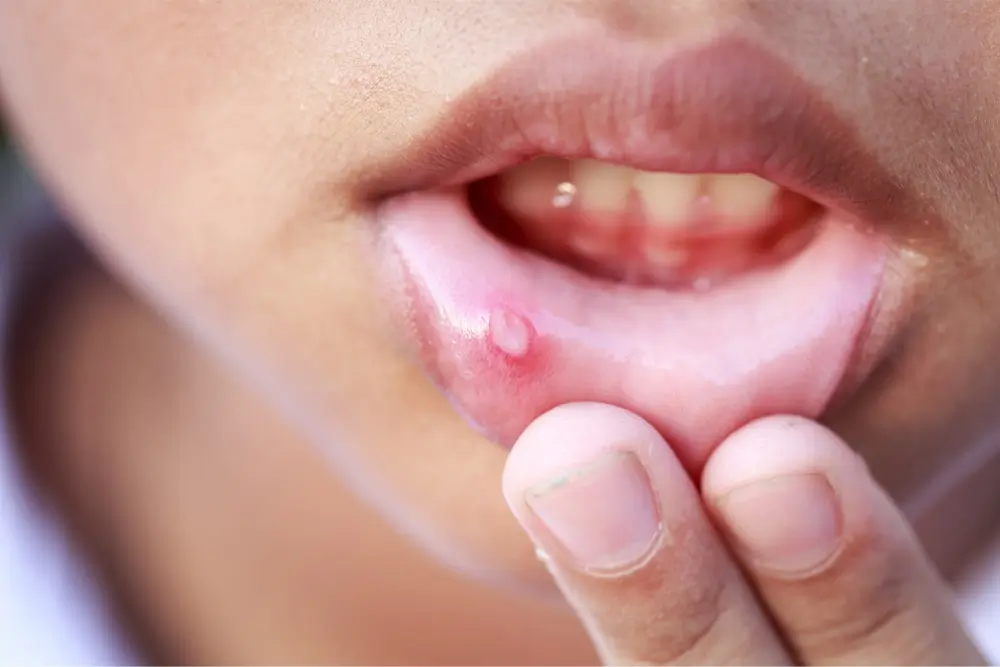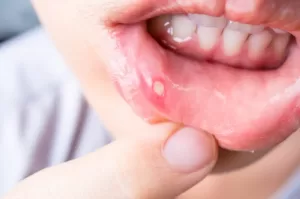What causes mouth ulcers? & when to see a doctor
What causes mouth ulcers?
- By far the most common type of mouth ulcers are “aphthous ulcers”. These are thought to affect 20-30% of the population, tending to start in childhood and getting less frequent as a person gets older.
- With aphthous ulcers, the lining of the mouth or tongue breaks down in a small round or oval area, often with a white, grey or yellow tinge in the middle, and an inflamed red edge.
- Aphthous can be very painful, and salty, spicy or acidic foods can make them sting badly.
- Some people get an aphthous ulcer once or twice a year, others may get them almost continuously, varying from single lesions to several at a time.
What causes aphthous ulcers?
It seems that some of the body’s immune cells, known as “T cells” become more active in people who have aphthous ulcers, leading to inflammation in the mouth, though it’s not known why T cells behave in this way.
Aphthous ulcers do not mean you are allergic to something.
You may be more likely to get aphthous ulcers in some situations:
- Anything that irritates or injures the mouth in some way, such as biting the inside of your cheek, dental work or vigorous toothbrushing.
- Low Vitamin B12, iron or folate- this may cause thinning of the lining of the mouth, making it easier for ulcers to form.
- Irritant chemicals in toothpastes (e.g sodium lauryl sulphate) could be a factor.
- People often report getting more mouth ulcers when they’re run-down or stressed. This may be because the immune system is affected by stress.
There have been some claims that mouth ulcers could relate to changes in hormonal levels in women, but so far there is no scientific evidence that this is true.
Interestingly, aphthous ulcers are more common in women, tend to run in families and are less common in smokers- perhaps because smoking causes thickening of the lining of the mouth.
Different types of aphthous ulcers
- Minor aphthous ulcers- about 85% of aphthous ulcers fall into this category. They appear on the tongue, cheeks, throat or floor of the mouth, and are small (less then 8mm), last for a few days, and heal without scarring.
- Major aphthous ulcers- in about 10% of cases, aphthous ulcers are bigger (more than 1 cm across) and deeper. They can last for weeks, and the person may feel unwell, with fevers and fatigue. These ones can sometimes lead to scarring. They tend to start a bit later, in adolescence.
- Herpetiform aphthous ulcers- so-called because they look a bit like herpes (cold sore) lesions, these are not actually caused by the herpes virus. They are uncommon (less than 5% of cases). A person may get clusters of many tiny ulcers which may join together.
Are mouth ulcers contagious?
- Aphthous ulcers are not contagious.
- There are some infections that can look a bit like aphthous ulcers, and these can be contagious (for example, hand foot and mouth disease or the cold sore virus)
Why do I keep getting mouth ulcers?
- Aphthous ulcers may come back a few times per year- some people get them almost continuously. It’s not known why this happens, and it can be quite frustrating and unpleasant.
- However, anyone who gets frequent mouth ulcers should see their doctor to make sure there is nothing else underlying
You should see your doctor and/or dentist if you get
- frequent mouth ulcers
- a mouth ulcer that isn’t healing
- a mouth ulcer that is steadily getting bigger
- other symptoms such as fever, stomach upset, diarrhoea or feeling generally unwell
Your doctor may advise blood tests or other investigations
What else causes mouth ulcers?
Aside from aphthous ulcers there are several other possible causes of mouth ulcers. Some other conditions that can cause areas of irritation or ulceration in the mouth include:
- Coeliac Disease
- Crohn’s disease or other forms of inflammatory bowel disease
- Any conditions that affect the immune system, for example HIV or IgA deficiency.
- Oral thrush (candida)
- Various viral or bacterial infections (e.g. hand foot and mouth disease or the herpes virus)
- Behcet’s disease
- A side effect of medication
- Mouth cancer
What does mouth cancer look like?
Mouth cancer can have the appearance of an ulcer, but will tend to be slow-growing, often painless, and feel hard to touch. If you have a lesion in your mouth that lasts for more than a week or two, you should see your dentist or doctor.
How to treat mouth ulcers
- The pain of aphthous ulcers can be relieved by using over-the-counter products from a chemist, such as anaesthetic gels.
- Sometimes doctors may prescribe a steroid inhaler- whilst these are normally breathed into the lungs as asthma treatment, they may be used to treat mouth ulcers by spraying the inhaler into the mouth.
- Oral antibiotics may help in some cases if bacterial infection is suspected.
- If iron, folic acid or Vitamin B12 are low, supplementation should be commenced.
- Obviously if there is concern about any other underlying medical condition, identifying and treating it may get rid of the mouth ulcers.
If you have mouth ulcers and are not sure what is causing them, you should speak to your doctor to have the diagnosis confirmed.
Further Patient Resources
Article Resources

Getting a Mental Health Care Plan in Australia: Your Guide
Getting a Mental Health Care Plan in Australia: Your Guide Mental health matters—and if you’re feeling overwhelmed, anxious, or down, a mental health care plan can help. But what is it, and how do [...]
UTI Symptoms and Treatment: What You Need to Know
UTI Symptoms and Treatment: What You Need to Know Urinary Tract Infections (UTIs) are common, uncomfortable, and often disruptive. But what exactly are the signs to watch for, and how can you get relief [...]
Free Mental Health Care Plan Online | Bulk-Billed by Qoctor
Free Mental Health Care Plan Online | Bulk-Billed by Qoctor Discover how to get a free, bulk-billed Mental Health Care Plan (MHCP) in Australia through Qoctor's telehealth service. Accessing [...]





